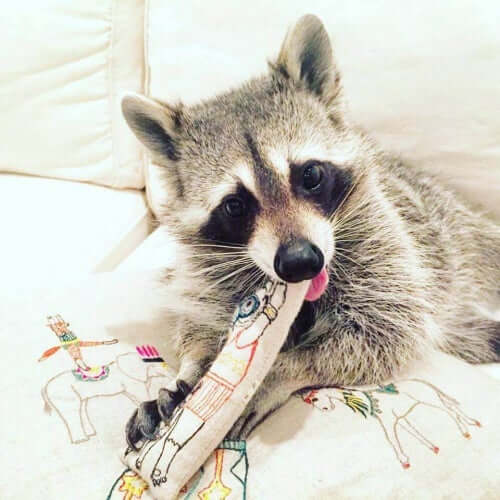The Raccoon: Characteristics, Behavior, and Habitat


Written and verified by the vet Eugenio Fernández Suárez
The raccoon is a very well-known species in the United States, but in Europe, it’s considered to be more exotic. This is true even despite the fact that this omnivore managed to spread over a large part of the continent during the 20th century, due to the furrier industry.
Characteristics of the raccoon
The raccoon is one of the most representative omnivorous animals in America. It belongs to the Procyonidae family, just like the coyote, and is also related to the red panda. Members of this species usually weigh around 15 pounds. Just the same, thanks to their great capacity to accumulate fat, they can come to weigh as much as 33 pounds. Its fur varies from grey to black, and one of its most distinctive features is its striped tail and its masked face.
These animals have teeth that have adapted to their varied diet, which consists of rodents, amphibians, eggs, fruits, and seeds. They possess a jaw with 40 teeth, including mature canines and molars that adapt to this mixed diet. Raccoon reproduction occurs around the beginning of the year, while young are born in April or May, depending on the latitude of their habitat.
The raccoon belongs to the Procyonidae family, just like the coyote. Members of this species usually weigh around 15 pounds. Just the same, thanks to their great capacity to accumulate fat, they can come to weigh as much as 33 pounds. Its fur varies from grey to black, and one of its most distinctive features is its striped tail and its masked face.
The behavior of the raccoon
The versatile diet of the raccoon means it’s one of the wild animals that’s most attracted to human garbage. Therefore, these animals are considered plagues and suffer greatly due to hunting and being run over. In their encounters with humans, they tend to be peaceful, but they can become aggressive and bite… especially in the presence of dogs and other domestic animals.
These mammals tend to go to river beds to eat their food and even to bathe. Therefore, they’re considered to be “washing bears”, which is actually the literal translation of their name in many languages. Raccoons are nocturnal and solitary animals, so males and females only come together in order to reproduce.

It’s worth mentioning that some ethologists challenge the classic conception of raccoons being solitary. In fact, recent studies demonstrate that they often share food and join by rivers to eat together. At the same time, they reveal that males form coalitions to defend their territories.
The habitat of the raccoon
Raccoons inhabit deciduous or mixed forests and sleep in the hollows of trees, burrows, and caves. They live near rivers and other waterways. Given their appreciation for human trash, and even pet food, they have been successful in adapting to urban settings. Therefore, we can also find them dwelling in garages, attics, and residential areas.
However, in the case of Spain, several very recent colonies have come into existence. This has to do with their use as pets after becoming popular in the United States. Therefore, Spain began importing these animals from the US, which has ended up in the abandonment of dozens of specimens.
Raccoons do not make good pets. They can become aggressive towards humans and, since they’re nocturnal, they have a hard time adapting to our schedules. When their owners abandon them, they destroy the nests of indigenous species and can catch rabies. Therefore, they are considered an invasive species and are often euthanized. This is just one more clear consequence of human selfishness.
In the case of Spain, several very recent colonies have come into existence. This has to do with their use as pets after becoming popular in the United States. Therefore, Spain began importing these animals from the US, which has ended in the abandonment of dozens of specimens.
The raccoon is a very well-known species in the United States, but in Europe, it’s considered to be more exotic. This is true even despite the fact that this omnivore managed to spread over a large part of the continent during the 20th century, due to the furrier industry.
Characteristics of the raccoon
The raccoon is one of the most representative omnivorous animals in America. It belongs to the Procyonidae family, just like the coyote, and is also related to the red panda. Members of this species usually weigh around 15 pounds. Just the same, thanks to their great capacity to accumulate fat, they can come to weigh as much as 33 pounds. Its fur varies from grey to black, and one of its most distinctive features is its striped tail and its masked face.
These animals have teeth that have adapted to their varied diet, which consists of rodents, amphibians, eggs, fruits, and seeds. They possess a jaw with 40 teeth, including mature canines and molars that adapt to this mixed diet. Raccoon reproduction occurs around the beginning of the year, while young are born in April or May, depending on the latitude of their habitat.
The raccoon belongs to the Procyonidae family, just like the coyote. Members of this species usually weigh around 15 pounds. Just the same, thanks to their great capacity to accumulate fat, they can come to weigh as much as 33 pounds. Its fur varies from grey to black, and one of its most distinctive features is its striped tail and its masked face.
The behavior of the raccoon
The versatile diet of the raccoon means it’s one of the wild animals that’s most attracted to human garbage. Therefore, these animals are considered plagues and suffer greatly due to hunting and being run over. In their encounters with humans, they tend to be peaceful, but they can become aggressive and bite… especially in the presence of dogs and other domestic animals.
These mammals tend to go to river beds to eat their food and even to bathe. Therefore, they’re considered to be “washing bears”, which is actually the literal translation of their name in many languages. Raccoons are nocturnal and solitary animals, so males and females only come together in order to reproduce.

It’s worth mentioning that some ethologists challenge the classic conception of raccoons being solitary. In fact, recent studies demonstrate that they often share food and join by rivers to eat together. At the same time, they reveal that males form coalitions to defend their territories.
The habitat of the raccoon
Raccoons inhabit deciduous or mixed forests and sleep in the hollows of trees, burrows, and caves. They live near rivers and other waterways. Given their appreciation for human trash, and even pet food, they have been successful in adapting to urban settings. Therefore, we can also find them dwelling in garages, attics, and residential areas.
However, in the case of Spain, several very recent colonies have come into existence. This has to do with their use as pets after becoming popular in the United States. Therefore, Spain began importing these animals from the US, which has ended up in the abandonment of dozens of specimens.
Raccoons do not make good pets. They can become aggressive towards humans and, since they’re nocturnal, they have a hard time adapting to our schedules. When their owners abandon them, they destroy the nests of indigenous species and can catch rabies. Therefore, they are considered an invasive species and are often euthanized. This is just one more clear consequence of human selfishness.
In the case of Spain, several very recent colonies have come into existence. This has to do with their use as pets after becoming popular in the United States. Therefore, Spain began importing these animals from the US, which has ended in the abandonment of dozens of specimens.
This text is provided for informational purposes only and does not replace consultation with a professional. If in doubt, consult your specialist.








